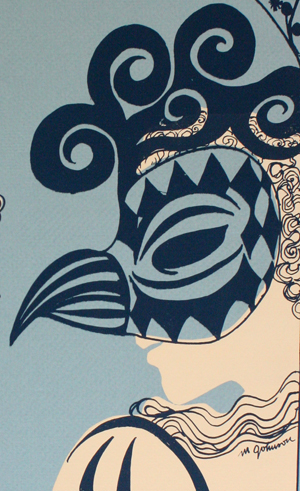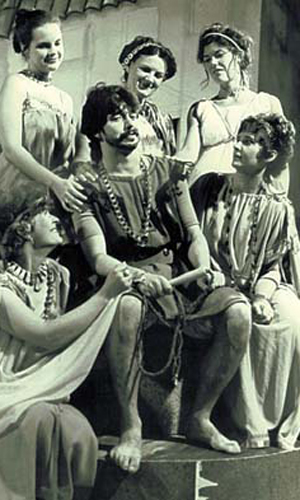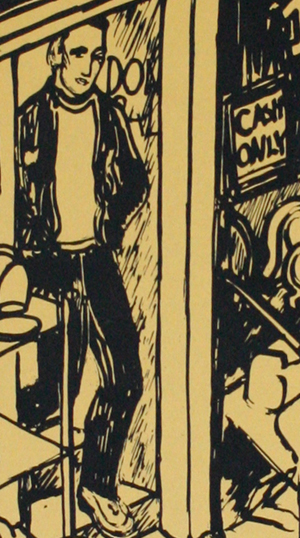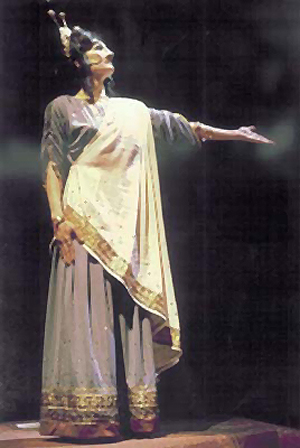PseudolusOctober 8–11, 1980A play by Titus Maccius Plautus Translated by Lewis Casson
Production Staff Director: James Fisher Scenic Designer: Kenneth Kloth Lighting Designer: Brian Jones '82 Costume Designer: Andrée Stern
Stage Manager: William Eastridge '82
Sim Dan Jacoby '84
Calidorus: Tim Padgett '84 Pseudolus: Michael Whelan '83 Calliph Jeff Been '81 Charinus: Jeff Hicks '83 Balli Virgil Miller '81 Phoenicium: Mary Huebner Harpax: Stephen Fleetwood '81 Simia: Rick Haffner '82 A Cook: Angelo McCabe A Boy: Charlie Bankart Ballio’s Purse Carrier: Jason Foos Another Boy: Chris Doemel Three Eunuchs: Doug Bradburn '84, Charles Merz '84, Barry Mann '83
Courtesans in the House of Ballio Palaestra: Brenda Bankart Erotium: Nancy Foos Xystilis: Linda Stover Aeschrodora: Tina Ryan Hedylium: Barbara Metzelaars
Sound: Jim Kwiecien
Technical Assistants: Brian Jones '82, Eric Mannel '83
No other playwright has had as profound an influence on the history of comedy as Titus Maccius Plautus (254 B.C.–184 B.C.). Pseudolus, the longest of the Plautine plays, was first presented in 191 B.C. and has delighted audiences for centuries focusing on the machinations of a crafty servant who helps his young master win his lady love from the clutches of the wicked pimp Ballio. The rich characterizations and absurd situations are typical of Roman comedy at its zenith.
This page is part of an ongoing project to document the history of the theatre productions performed at Wabash College. If you have information not included on this page, please contact the Theater Department or Professor Dwight Watson (watsond@wabash.edu).
|
|
American BuffaloNovember 20–23, 1980A play by David Mamet
Production Staff Director: Peter Wright Scenic and Lighting Designer: Ken Kloth Costume Designer: Andrée Stern Sound Designer: Jeff Hicks ‘83 Stage Manager: Ben McCormick ‘84
Cast List Donny Dubrow: Michael Whelan ‘83 Bobby: Connie Ford Walter Cole (Teach): Barry Gest ‘82
Production Assistance Graphics: Mary Johnson Propsmaster: Angelo McCabe Sound Technician: Parv Gillim ‘83 Lighting Operator: Rick Haffner ‘82 Technical Assistants: Eric Mannel ‘83 and Brian Jones ‘82
Winner of the 1976 Obie award and the 1977 Drama Critics Circle Award, American Buffalo was David Mamet’s first Broadway play. It tells of three small time crooks in a Chicago junk shop who plot to “rip off” a valuable coin collection. The play examines what has become of our ideas about free enterprise and other founding principles in terms that are alternatively funny and brutal. Its language is raw; its characterizations uncompromising.
This page is part of an ongoing project to document the history of the theatre productions performed at Wabash College. If you have information not included on this page, please contact the Theater Department or Professor Dwight Watson (watsond@wabash.edu). |
|
AgamemnonFebruary 11–14, 1981
A play by Aeschylus
Translation by Richmond Lattimore
Original Music composed by Fredric Enenbach
Production Staff
Director: James Fisher
Scenic Designer: Kenneth Kloth
Costume Designer: Andrée Stern
Stage Manager: Jeff Hicks ‘83
Asst. to the Director: William Eastridge ‘82
Production Consultant: John Fischer
Cast List
Watchman: Daryl Johnson ‘82
Chorus Leader: Virgil Miller ‘81
Chorus: Angelo McCabe, Michael Whelan ‘83, Benjamin McCormick ‘84, Rick Haffner ‘82, Henry Sabetti ‘84, Dan Jacoby ‘84
Clytaemestra: Sue Ann Meek
Handmaidens: Nancy Foos, Brenda Barnes
Herald: Brian Jones ‘82
Agamemnon: Jerry Billings
His Soldiers: Darryl Johnson ‘82, Brian Jones ‘82
Cassandra: Barbara Metzelaars
Aegisthus: Michael Robak ‘81
His Soldiers: Parvin Gillim ‘83, Charlie Moore
Production Assistance
Graphics: Mary Johnson
Orchestra: Kenneth Berger, Michael Millin ‘83, Randall Stump, Jeffrey Warbinton ‘81
Technical Assistants: Brian Jones ‘82, Eric Mannel ‘83
Light Crew: Mike McDonough ‘82, Eric Mannel ‘83
Windchimes: Nancy Enenbach
The trilogy called Oresia by Aeschylus (525-456 B.C.), of which Agamemnon is the first play, deals with the succession of crimes and retribution in the house of Atreus. The tragedy of Agamemnon involves war and politics as well as a domestic triangle, and the rich and subtle poetry of the play is the perfect medium for its problems and insights.
This page is part of an ongoing project to document the history of the theatre productions performed at Wabash College. If you have information not included on this page, please contact the Theater Department or Professor Dwight Watson (watsond@wabash.edu).
|
|
Much Ado About NothingApril 16–18 and May 15–16, 1981A play by William Shakespeare
Production Staff
Director: Peter Wright
Scenic and Lighting Designer: Ken Kloth
Costume Designer: Andrée Stern
Stage Manager: Emily Runion
Cast List
Don Pedro: Mike Whelan ‘83
Don John: Paul Jones ‘82
Claudio: Angelo McCabe
Benedick: Virgil Miller ’81
Balthazar: Matthew White ‘82
Conrade: Barry Mann ‘83
Borachio: Rick Haffner ‘82
Leonato: Jeff Been ‘81
Antonio: Dan Jacoby ‘84
Hero: Robin Mallory
Beatrice: Barbara Metzelaars
Margaret: Janet Wallace
Ursula: Connie Ford
Lady in Waiting: Wendy Ludwig
Lady in Waiting: Debbie Wilbur
Friar Francis: Ben McCormick ‘84
Dogberry: Kevin West ’83
Verges: Chuck Merz ‘84
First Watch: Steve Nokes ‘80
Second Watch: John Ruddy ‘81
Sexton: Tom Bowen
Musicians: Chris Roscher, Jeff Warbinton ‘81, Hal Cardona, Paul Blair, Scott Jones ’81
Production Assistance
Graphics: Mary Johnson
Technical Assistants: Eric Mannel ‘83, Brian Jones ‘82
Lighting Crew: Jeff Hicks ‘83, Bill Eastridge ‘82
Props: Steve Fleetwood ‘81, Linda Stover
Masks: Connie Moore
Hairstyles: Janna Conway
Lobby Display/High School Consultant: Linda Evans
Written in 1598-99, Much Ado about Nothing is one of Shakespeare’s greatest romantic comedies. Beautifully shifting between prose and poetry, it gives us lovers who mistake each other only because they do not dare to trust each other or themselves in Hero and Claudio, Beatrice and Benedick; as well as the dull witted bumbling of Dogberry and Verges. Often called a “feast of wit,” it is an entertainment which delicately mingles humor of various kinds to a happy conclusion.
This page is part of an ongoing project to document the history of the theatre productions performed at Wabash College. If you have information not included on this page, please contact the Theater Department or Professor Dwight Watson (watsond@wabash.edu). |

Poster
|



